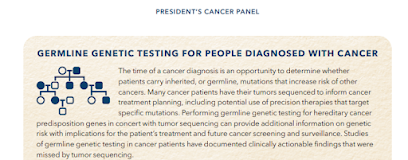On February 3, I highlighted the press materials and reports associated with rebooting the "Cancer Moonshot" program. This program got $1.8B in 2016, as part of 21st Century Cures, and this 7-year funding runs out in 2023.
Another important section to highlight is the emphasis on germline testing (along with somatic tumor testing) in cancer patients. See PDF page 47 and numbered page 27 in the report, online here. The report encourages use of paired germline-somatic testing. By coincidence, this was also a topic at last week's AMA CPT meeting.
The report authors write,
The time of a cancer diagnosis is an opportunity to determine whether patients carry inherited, or germline, mutations that increase risk of other cancers. Many cancer patients have their tumors sequenced to inform cancer treatment planning, including potential use of precision therapies that target specific mutations.
Performing germline genetic testing for hereditary cancer predisposition genes in concert with tumor sequencing can provide additional information on genetic risk with implications for the patient’s treatment and future cancer screening and surveillance. Studies of germline genetic testing in cancer patients have documented clinically actionable fndings that were missed by tumor sequencing.
Results of germline genetic testing also have implications for family members. If a cancer patient is found to harbor a cancer-associated germline variant, cascade testing of family members can help identify other carriers. This may lead to increased screening adherence, enhanced screening, or other risk-reducing interventions.
The Panel supports assessment of eligibility for germline genetic testing for all people diagnosed with cancer. If variants of concern are identified, cascade testing of family members should be offered.
Citations include Samadder, JAMA Onc 2021 (PMID 33126242, and Lincoln, JAMA Netw Open, 2021 (PMID 33026450). In the latter study, using Invitae data, 2,000 patients were studied, all with tumor testing and germline testing, and 30% had pathological germline variants, many of which were missed by tumor-only sequencing.
